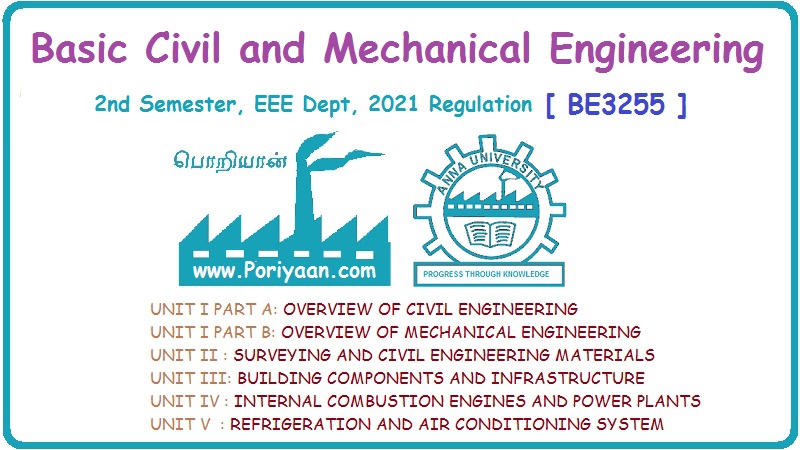Basic Civil & Mechanical Engineering: UNIT II: k. Cement concrete
Constituents, Ingredients of Cement Concrete
Lime concrete made of limė, surkhi and water was used in earlier days of construction. Later, cement concrete and reinforced cement concrete came in this field.
UNIT - II
Chapter - 4 (F)
CEMENT CONCRETE
Lime
concrete made of limė, surkhi and water was used in earlier days of
construction. Later, cement concrete and reinforced cement concrete came in
this field. Cement Concrete (or simply Concrete) is defined as a building
material prepared by mixing 1. Cement, 2. Fine Aggregate, 3. Coarse Aggregate
and 4. Water, in suitable proportions. It is allowed to cure to become hard
like stone.
CONSTITUENTS / INGREDIENTS OF CEMENT CONCRETE
1. Binding Material
Cement
binds the fine aggregate and coarse aggregate into a solid mass. It helps to
fill the voids and gives density to the concrete. [Lime is the binding material
in Lime Concrete.]
2. Fine Aggregate
Fine
Aggregate is river sand or surkhi. Fine aggregate serves to fill the voids in
coarse aggregate and reduce the quantity of cement. Fine aggregate should be in
the size range of 0.15 mm (150 microns) to 4.75 mm. What is Surkhi? Surkhi is
brick dust. It is made from slightly under-burnt bricks. If used wholly in
place of sand, surkhi causes disintegration of concrete.
3. Coarse Aggregate
Coarse
aggregate is crushed or broken stone, gravel or broken brick. Around the
surfaces of the course aggregate, the binding material adheres in the form of a
film. Coarse aggregate is graded in the size range of 4.75 mm to 20 mm.
4. Water
Water
used for concreting should not contain chemicals. Chemicals cause harmful
effects. Water fit for drinking is fit for concreting too. Water serves two
purposes in concrete mixing. The purposes are:
(i)
Paste: Water acts chemically with cement to form a paste.
The paste which upon hardening, binds the fine and coarse aggregates to form a
permanent mass.
(ii)
Workability: Water gives workability to the mixture
by enabling the concrete-mix to flow into moulds. Workability of concrete is
the ease with which it is mixed, transported and placed in position so that the
concrete remains homogeneous.
Water
Cement Ratio: It is the ratio of weight of water used
to that of cement. It depends upon workability and strength desired. Wet
concrete is more workable than dry concrete. If concrete is too wet, it will
have a non-uniform composition. If the concrete is too dry, it will be
difficult to handle and place it in position.
Volumetric
Proportions of Ingredients of Concrete: Proportions of cement
: sand : coarse aggregate for various types of constructions range from 1:1:2,
1:2:3, 1: 2:4 and 1:3 : 6.
Basic Civil & Mechanical Engineering: UNIT II: k. Cement concrete : Tag: : - Constituents, Ingredients of Cement Concrete
Related Topics
Related Subjects
Basic Civil and Mechanical Engineering
BE3255 2nd Semester 2021 Regulation | 2nd Semester EEE Dept 2021 Regulation
